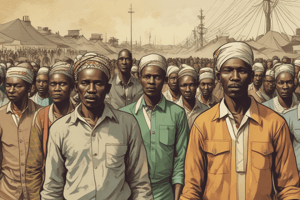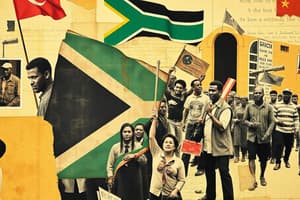Podcast
Questions and Answers
What was a significant act by the US Congress in June 1963 regarding military involvement in Vietnam?
What was a significant act by the US Congress in June 1963 regarding military involvement in Vietnam?
- The Vietnam War draft was abolished.
- The Case-Church Amendment was signed. (correct)
- The Gulf of Tonkin Resolution was passed.
- The US entered into a peace treaty with Vietnam.
What event significantly escalated the ethnic violence in Rwanda in 1994?
What event significantly escalated the ethnic violence in Rwanda in 1994?
- The declaration of independence by the Tutsis.
- The signing of a peace agreement.
- The assassination of the Rwandan president. (correct)
- The withdrawal of UN peacekeepers.
How did the public reaction in the United States influence the Vietnam War?
How did the public reaction in the United States influence the Vietnam War?
- The public remained indifferent to the war's progress.
- Opposition to the war resulted in a quick victory.
- Public support led to increased troop deployments.
- Negative sentiment forced leaders to alter foreign policy. (correct)
What was the result of the military actions in Vietnam by April 1975?
What was the result of the military actions in Vietnam by April 1975?
What limited the effectiveness of General Romeo Dallaire's peacekeeping efforts in Rwanda?
What limited the effectiveness of General Romeo Dallaire's peacekeeping efforts in Rwanda?
Which organization was primarily responsible for leading the struggle against apartheid in South Africa?
Which organization was primarily responsible for leading the struggle against apartheid in South Africa?
What role did international opinion play in the Anti-Apartheid Movement?
What role did international opinion play in the Anti-Apartheid Movement?
In what year was Nelson Mandela released from prison?
In what year was Nelson Mandela released from prison?
What was the ANC's initial approach to combatting apartheid?
What was the ANC's initial approach to combatting apartheid?
What major event did Mandela and other ANC leaders face in 1964?
What major event did Mandela and other ANC leaders face in 1964?
What was one consequence of the American involvement in the Vietnam War by 1963?
What was one consequence of the American involvement in the Vietnam War by 1963?
Who was President of the United States during the significant escalation of the Vietnam War?
Who was President of the United States during the significant escalation of the Vietnam War?
What was the status of the anti-war movement in the early years of American involvement in Vietnam?
What was the status of the anti-war movement in the early years of American involvement in Vietnam?
Flashcards
The African National Congress (ANC)
The African National Congress (ANC)
The African National Congress (ANC) was a key organization in the fight against apartheid in South Africa. It was a liberation movement that aimed to end racial segregation and discrimination.
Nelson Mandela
Nelson Mandela
Nelson Mandela was a prominent leader of the ANC, known for his commitment to ending apartheid. He started as a lawyer and became president of the ANC.
ANC's strategies in the fight against apartheid
ANC's strategies in the fight against apartheid
The ANC initially focused on legal means like civil disobedience to fight apartheid. However, they later resorted to acts of violence in response to violent actions by the South African government.
International pressure on South Africa
International pressure on South Africa
Signup and view all the flashcards
Mandela's arrest and imprisonment
Mandela's arrest and imprisonment
Signup and view all the flashcards
Mandela's release and the ANC's legalisation
Mandela's release and the ANC's legalisation
Signup and view all the flashcards
The 1994 election in South Africa
The 1994 election in South Africa
Signup and view all the flashcards
US involvement in the Vietnam War
US involvement in the Vietnam War
Signup and view all the flashcards
Impact of Media on Vietnam War
Impact of Media on Vietnam War
Signup and view all the flashcards
Anti-War Movement
Anti-War Movement
Signup and view all the flashcards
Rwandan Genocide
Rwandan Genocide
Signup and view all the flashcards
International Response to Rwandan Genocide
International Response to Rwandan Genocide
Signup and view all the flashcards
Romeo Dallaire
Romeo Dallaire
Signup and view all the flashcards
Study Notes
Anti-Apartheid Movement in South Africa
- Black South Africans fought apartheid through organizations like the ANC
- Nelson Mandela, an ANC leader, initially used legal and civil disobedience, then violence in response to South African government actions
- International pressure on South Africa included sanctions, trade reduction, loan refusals, and Olympic exclusion, isolating the country.
- Mandela became a global symbol against apartheid and was arrested in 1962 for inciting a strike
- Other ANC leaders were tried in 1964 for attempting violent overthrow.
- In 1990, Mandela was freed from prison, and the ANC was allowed to operate again in South Africa.
- The ANC won the first free interracial election in 1994, making Mandela the first black president.
The War Against the Vietnam War
- The US deployed troops to South Vietnam in 1961 to support the Saigon government.
- Increased American casualties and anti-war protests grew during Lyndon Johnson's presidency.
- Johnson withdrew from public office in an attempt to end involvement.
- Richard Nixon won the next election
- Initially limited to academics, the anti-war movement expanded as American involvement increased, reaching over 500,000 troops by 1968 (drafted).
- Television coverage brought the realities of the war to American homes.
- The anti-war movement significantly influenced US foreign policy.
- The Case-Church Amendment (1963) prohibited further intervention.
- The war ended in 1975 with the fall of Saigon.
Rwanda
- In 1994, an estimated 800,000 people were killed in 100 days of ethnic violence.
- Rwanda's population is primarily Hutu and Tutsi.
- The death of the Hutu Rwandan president (in plane crash) triggered a retaliatory attack on Tutsi population.
- UN peacekeeping forces, led by Romeo Dallaire, were not adequately equipped to deal with the crisis and were reduced by the US.
- The international community largely failed to intervene effectively.
Studying That Suits You
Use AI to generate personalized quizzes and flashcards to suit your learning preferences.




